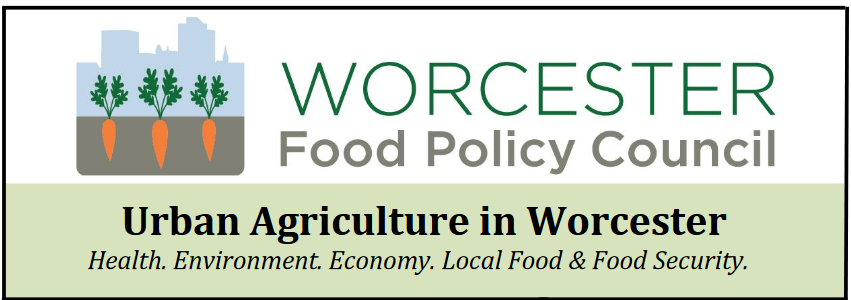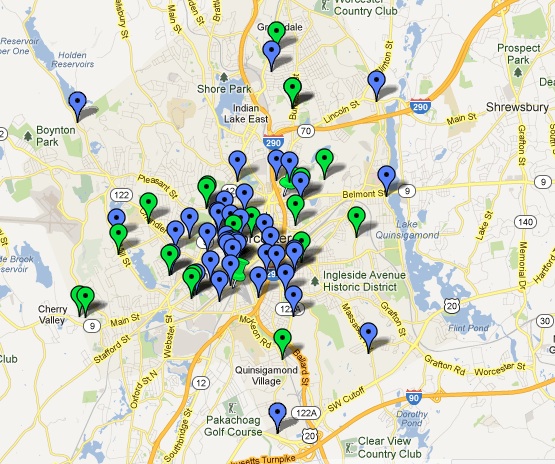
Action Alert
Join us at City Hall Tuesday, January 31, to help support the growth of urban agriculture in Worcester. City Councilor Sarai Rivera is requesting that the City Manager update the Council on progress toward releasing a draft of the city’s proposed Urban Agriculture Ordinance, which was originally proposed in 2014. Our city councilors need to hear why this is important to the people and businesses that call Worcester home.
What is Urban Agriculture?
Urban agriculture can be broadly defined as growing food within the city. It can include growing food on vacant land, aquaponics, hoop houses, school gardens, community gardens, on rooftops, in backyards. It also can include keeping bees. The food grown may be for personal consumption or for commercial use. UrbanAg increases access to healthy, fresh, locally grown foods by increasing the amount of food produced locally. Access to healthy foods will increase through such things as an increase of farm stands in neighborhoods across our city and new small businesses producing and using locally grown produce.
Who Are Urban Growers?
Urban growers can include children, adults, the elderly, recent immigrants or refugees. Gardens or farms can be run by individuals, businesses, restaurants, non-profits, community groups, or even government entities. The land can be privately owned or public lands, such as public housing, parks or city-owned vacant lots. Cities throughout the country are using urban agriculture initiatives to revitalize and beautify neighborhoods. Programs like Columbus, Ohio’s Growing to Green initiative have sparked community gardens, children’s programs, garden hubs, educational efforts and many small businesses taking advantage of fresh fruits, vegetables and flowers that don’t have to be imported from outside the city. The economic, health and revitalization benefits go directly to city residents.

Why is Urban Agriculture Good for Worcester?
The local food movement, is growing in response to the economic demand from consumers who understand that buying local food is the good for the environment and it has multiplier effects on the economy. Local food also tastes better because it is farm to table.
Local food keeps local land in production and local money in the community, often costs less than conventionally produced food, and builds community relations. Decentralized production also reduces food safety risks, as long-distance food can potentially be contaminated at many points on its journey to our plates.
Source: How Green Is Local Food? Earth Institute Columbia University
Growing food within the city benefits individuals as well as the community as a whole. The people involved in growing food receive many physical as well as mental and emotional benefits. The physical exercise of growing food is a tremendous health benefit, as is the community building that is fostered amongst growers. Growing and producing food provides even greater opportunities to consume a variety of fruits and vegetables which helps Worcester achieve its goal of becoming the healthiest city by 2020! Urban Agriculture also provides more culturally appropriate food for our multicultural city. In addition, when these enterprises are for commercial purposes it is bringing local jobs into our economy.
The excess produce can be sold at local restaurants, grocery stores, farmers’ markets or farm stands without incurring high transportation costs, hopefully providing fruits and vegetables for residents with a variety of economic means. Communities also benefit from the greenery in their neighborhoods, especially when gardens or farms replace vacant lots or blighted areas. The greenspaces also help to clean our air, support improved rainwater absorption. Increased greenspace has been linked to reduced crime and improved sense of well-being for residents. Also, individuals that engage in this commercially benefit from having a form of employment. Urban agriculture improves health, supports community development, and provides economic benefits.
The Public Policy Ask
Our legislation is modeled after Boston’s successful Article 89
Key Zoning changes that we want to ensure are:
- Our Zoning code will legally recognize the entrepreneurial spirit of residents to farm in the city and promote their business development.
- Farming on a parcel of land under one acre will be allowed by right and will not require a permitting process in any Zone of the city. (Just like Boston)
- It will promote a pipeline for a community gardener to become a commercial farmer.
- It helps create the infrastructure to sell farm produce using farm stands & farmers markets.
- Honey bees are permitted and legal.
Produced by Worcester Food Policy Council (Martha martha@worcesterfoodpolicycouncil.org 508-723-4550




Question. Will this Urban Agriculture Ordinance tie in to new laws for marijuana and business plans for that industry in Worcester? I am totally behind urban farming but I wonder how these two related practices might have an effect on each other. Are their issues where there are common goals or conflicting interests?
That’s an interesting question, Karen. As of now, the state has delayed implementation of commercial growing laws in Massachusetts for a year. The proposed Worcester ordinance, however, is concerned with where and how crops are grown rather than which crops are being grown. Based on that, it’s likely that it will also cover marijuana as a commercial crop. The point about common and conflicting interests is a good one, and it’s something we’ll be looking at over the next few months. If we get a more definite answer, we’ll definitely update our information about it. Thanks for asking!
Pingback: Worcester Food System - 10 Things We're Thankful For - Worcester Food Policy Council
[…] is uniquely positioned to benefit from increasing access to urban farming. That’s one of the reasons that we’ve been anxiously shepherding a new zoning ordinance […]